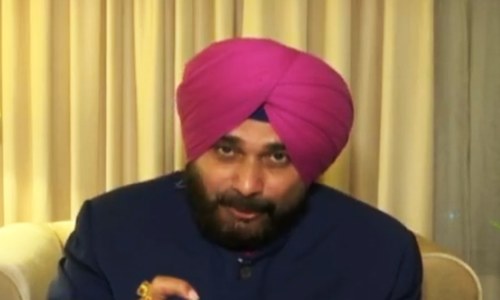Despite Indian government's refusal to engage in dialogue, Pakistani authorities are willing to open the Kartarpur border crossing so that Sikh pilgrims can visit Gurdwara Darbar Sahib without a visa, Information Minister Fawad Chaudhry said in an interview to Hindustan Times on Saturday.
Talking to the Indian publication, Chaudhry said that while India's decision to cancel the meeting — which was to be held between both countries' foreign ministers on the sidelines of the United Nations General Assembly — was "unfortunate", citizens should not be made to suffer.
Explore: What the Indian media is saying about Modi govt's cancellation of UNGA meeting with Pakistan
"This is an issue of the ordinary people, Sikhs and other Indian pilgrims, and an issue of faith," he said in a phone interview. "They shouldn’t suffer and we want to formalise the informal proposal the Pakistan army chief made to [Punjab State Minister Navjot Singh] Sidhu."
Last month, Sidhu had visited Pakistan to attend Prime Minister Imran Khan's oath-taking ceremony. He had also met Army Chief Gen Qamar Javed Bajwa, who told him that "when [Sikh community] celebrates the 550th birthday of Baba Nanak [...] we'll open the Kartarpur-Sahib Corridor."
In his interview to Hindustan Times, Chaudhry reiterated the government's stance to look for a peaceful solution to the Kashmir issue — which he said was the basic issue between Pakistan and India — and said that New Delhi had "wasted a wonderful opportunity [for peace] by rejecting the prime minister's offer".
On Friday, the Indian government had cancelled the meeting following domestic pressure just a day after it agreed to it. Pakistan, in response, voiced its "deep disappointment" not only over the reasons cited for the cancellation of the meeting — the alleged killing of India's Border Security Force's soldier and Pakistan's decision to release stamps honouring Kashmir freedom fighter Burhan Wani — but also over “reference in the Indian MEA statement to the person of the Prime Minister of Pakistan”.
Also read: 'Pakistan has nothing to lose' — analysts weigh in on Modi govt's U-turn on UNGA meeting
During his interview, Chaudhry said that while Pakistan had "several options" including war, the government considers it "foolish" to adopt a confrontational approach. Pointing out that both India and Pakistan are nuclear powers, Chaudhry asked: "Can't we look for a solution to our problems through dialogue?"
Chaudhry said that India's sudden change of heart is a result of the country's domestic problems. He pointed out that elections in India were a few months away and "anti-Pakistan rhetoric sells" in the country.
He also rubbished India's accusations of Pakistan's interference in held Kashmir.
"It is wrong to hold Pakistan responsible for the ongoing struggle in held Kashmir," he said, but reiterated that: "Pakistan supports Kashmiris' struggle for freedom."
He further said that Pakistani authorities had "solid evidence" of Indian interference in Balochistan.
Kulbhushan Jadhav — an Indian spy who is under the custody of Pakistan's armed forces — is sufficient proof of India's interference in Balochistan, Chaudhry said.
He said that Pakistan was ready to hold talks on every issue, but the efforts cannot remain one-sided.
"We cannot change our neighbours," the information minister said. "India has to decide [its future strategy]."
"Pakistan extended an offer of peace"
Talking to the media at home, Chaudhry said that the Pakistani government had "talked about peace" and wanted to hold talks with India as both countries have had "bitter experiences" in the past.
"Pakistan and India have been fighting for the past 70 years. Both [countries] are nuclear powers. If a war breaks out, then the country that is left standing can keep talking," he said.
Referring to an ongoing corruption scandal surrounding Indian Prime Minister Narendra Modi, Chaudhry repeated his claim that New Delhi's decision to cancel the meeting was influenced by domestic pressure.
"Just like Nawaz Sharif was caught up in the Panama Papers, Modi is now caught up in the Rafale planes scandal," the information minister said.
He insisted that the development of the region was vital for the progress of India and Pakistan.
"In India, there is a mindset that in order for the country to progress, they must weaken Pakistan. But if you study history, this is not the case. The region must be strengthened for the countries to develop. Our army chief has also stressed this point earlier," he said.














































